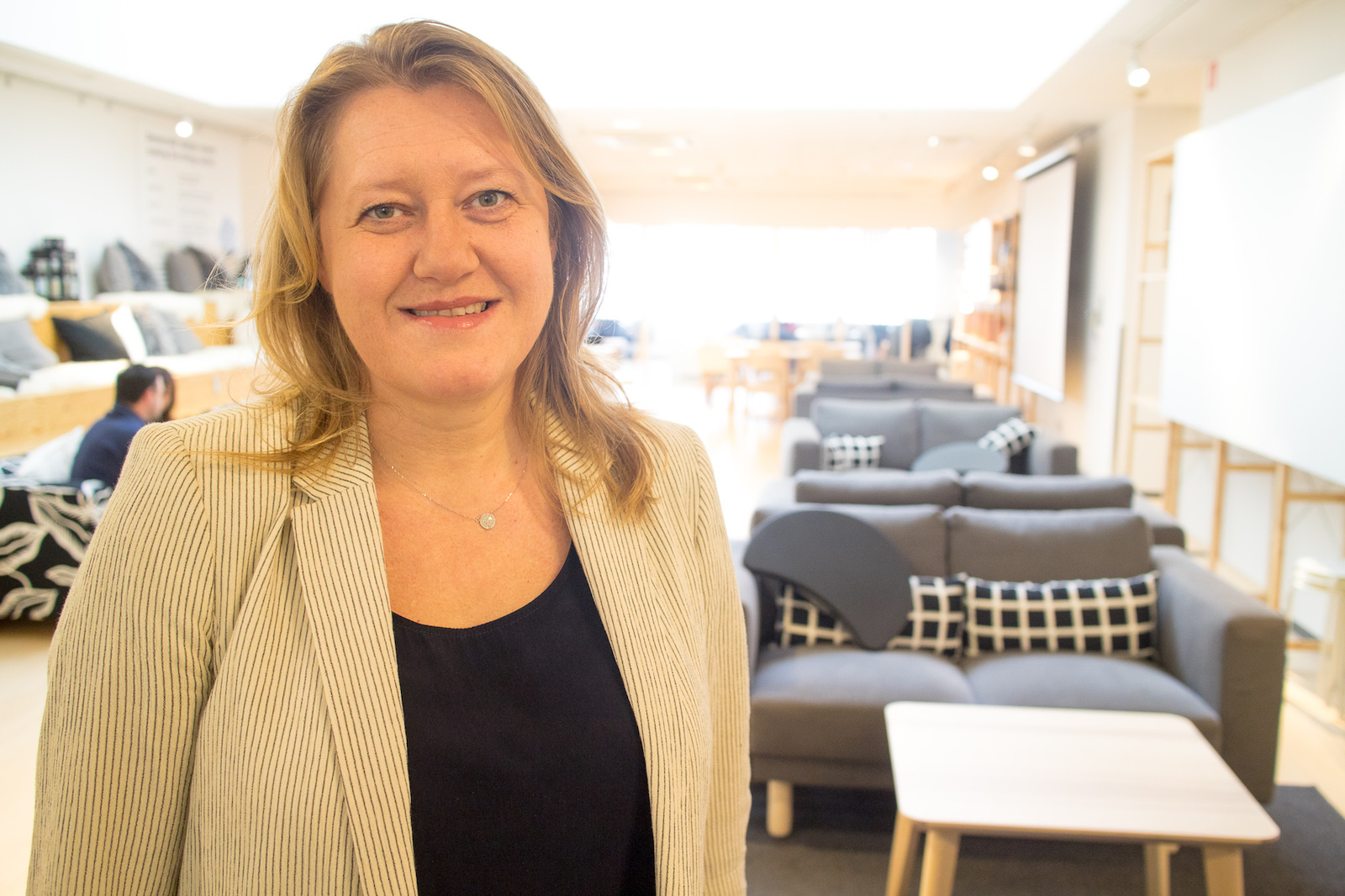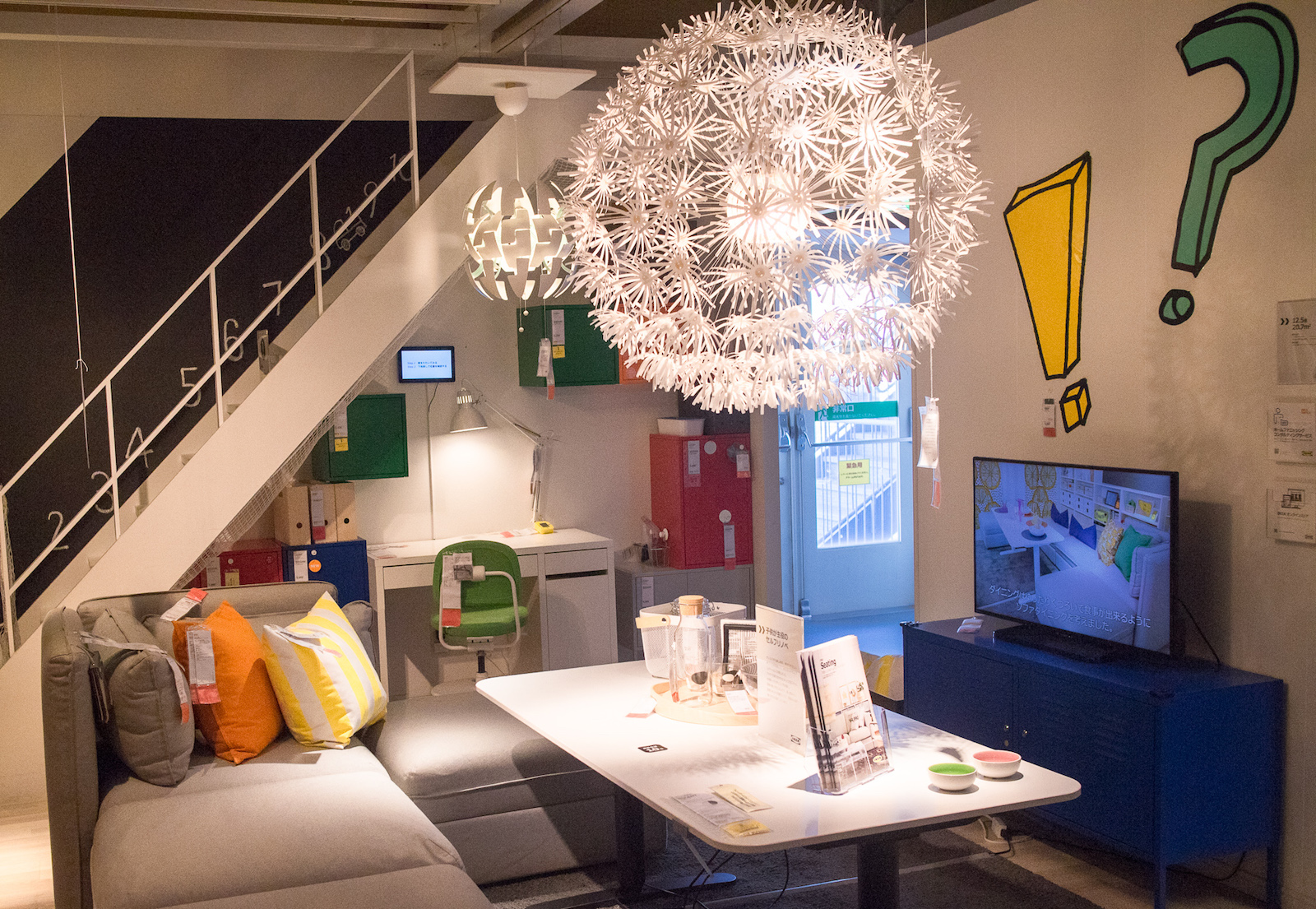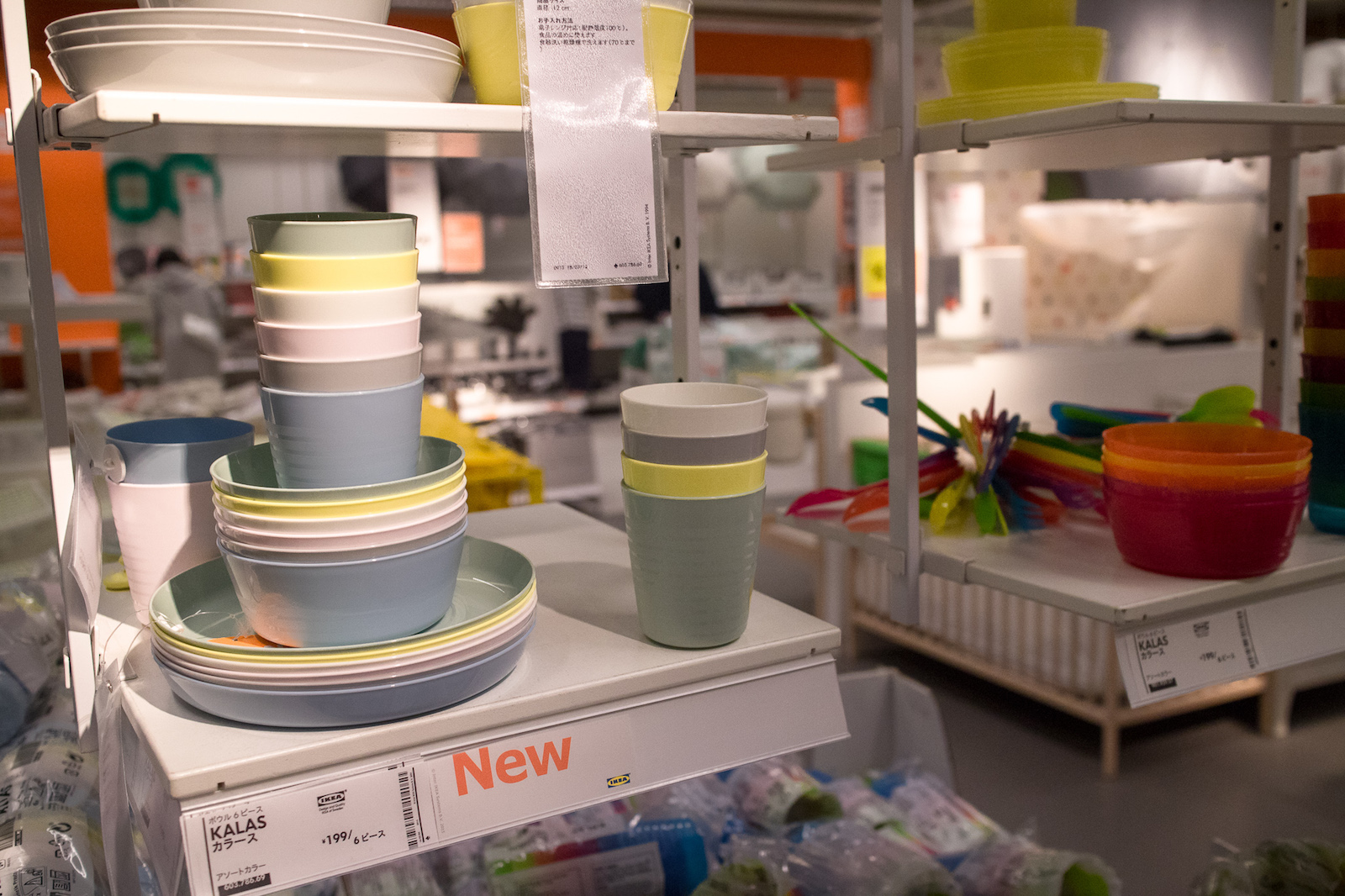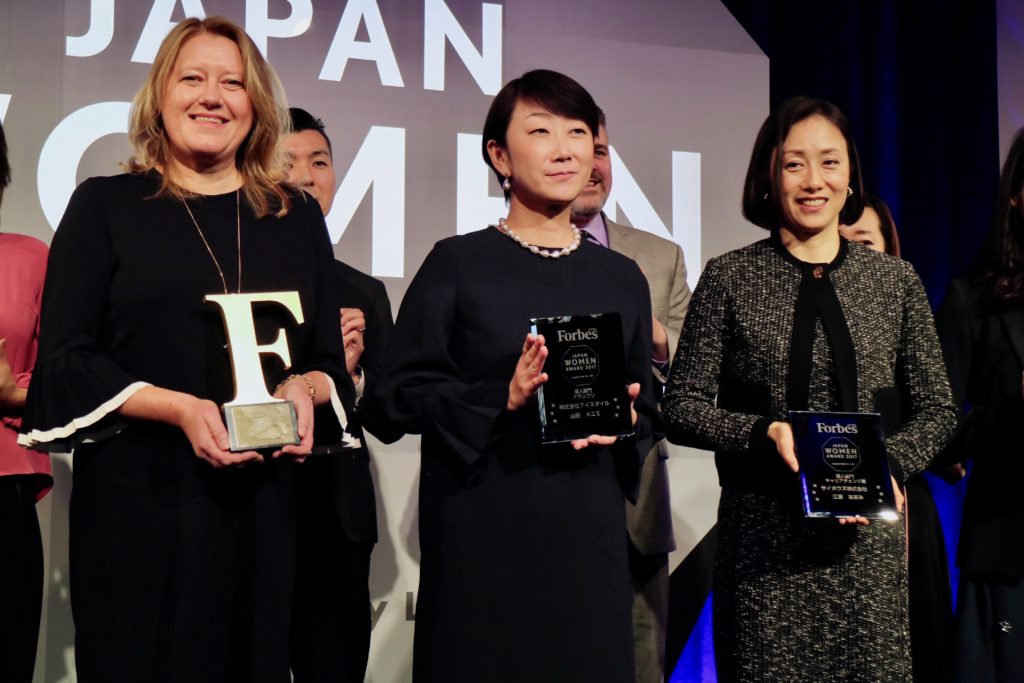Ikea Japan CEO Helene von Reis is a 20-year veteran of the brand, who has moved up the ranks globally at the furniture and home goods retail giant.
With more than 300 stores, Ikea is the world's largest furniture retailer and is operating in 41 countries.
Von Reis, a Swede who works from the Ikea Japan headquarters in Funabashi, Chiba Prefecture, is leading the way for Japan with steadfast tenets of the Ikea strategy — equal pay, equal opportunity and diversity inclusion in the name of creating products for everyday life.
About a year ago, Ikea Japan launched its online shopping store to bring the Japan brand up to speed with modern purchasing habits, while still maintaining a tight focus on customer experience at their physical locations of which there will be 10 nationwide come October. Experiential factors like free in-store Wi-Fi, showrooms, eateries with foods like Swedish meatballs and supervised play areas for children while parents shop are what keep people coming back to the store in an online world, says von Reis.
Japan Today met with the CEO in her “favorite meeting room” accented with a bright green velvet couch to discuss her vision, the Japanese market and how gender equality in the workplace is possible.

On the Ikea Japan website, it talks about introducing products that make everyday life more “playful.” What do you (or Ikea) do to make every day more playful for you and your coworkers?
I believe in playfulness, overall, from a human perspective. If you take the office, for example — we all perform better and are actually more productive when we also have a little bit of fun. And when we laugh a little bit, it doesn’t make us less intelligent — I think it’s the opposite. You work hard. You work many hours. It should be fun. I truly believe in that.
In your first year or so, what is one major challenge you’ve faced as CEO of Ikea? How did you deal with it?
I think that there’s hundreds of articles at the moment about how retail is disrupted and, of course, we face the same. So, behaviors are changing with online shopping, so for sure, its not a little thing. It’s a mega thing. And we are only in the beginning of it. Luckily, we started an online business a year ago, and it has developed very well for us, but of course, the transformation, you know — if you’re going to shop online, how are we going to make you value your time at the store? That, for sure, is a challenge.

So how have you been able to get over that?
You have to attract (customers) to the store with experiences. In our case, food is super important, and we know that many customers come to us to eat because we have good Swedish food and Japanese know Swedish food. So, we know food is a true driver and for families with children, we would like to develop more into experience destinations. We have some parts in the store today [for kids], but I would say it needs to be developed more. [To entertain kids] it needs to be digital somehow, or it needs to be fun in a new way. Children above the age of 5 — how do you entertain them if they go to Ikea?
I saw the play area downstairs. Is it a daycare?
No, next to the office is a daycare for our co-workers. So the store area is just a supervised play space. Parents can shop and leave kids there for an hour.
I have to say, the on-site daycare — that’s very nice.
It’s not that it’s nice — it’s totally needed. Totally necessary, particularly for women with children to be able to go back to work.
That’s definitely a different perspective from myself growing up in the U.S. and also for people in Japan. We might more often see daycare as something extra instead of something necessary.
Yes. Here [in Japan], the way families are put together and function in Japan, many women don’t go back to work because it’s too costly and the investment is too big, timewise, what you get out of it. … If you work part time as a woman in Japan, usually you don’t have the same benefits for pension and insurance, and you’re not paid equally. But at Ikea, we have changed that, so it’s equal pay for equal work. We would like to put daycares in every store in Japan, so that is what we are working on right now.


What is unique about Japanese Ikea consumers vs. consumers in the other countries where you’ve worked?
First of all, it starts with the fact that Japanese people are not showcasing their homes to foreigners, or even family very much. Your home is a functional place in Japan. In other markets where I have worked, it is also a place where you invite guests and family and that you are proud of showing. Here, it doesn’t carry that dimension very much. So that's a big difference. It is, of course, a place where you want to feel safe and comfortable but the home furnishing interest is very low in Japan
As you said, home items in Japan should be useful. What are some of your top products here?
Flexible, small storage that you can move around easily. We have a trolley called a "raskog." It’s a top seller because it's such a versatile product. You can see it in many small businesses — everything from a hairdresser salon to little cafes to little shops. So, I would say versatile, multi-functional products. Then you have, actually, plastic bags — which is crazy to say — but you know we have these little plastic bags called “istad” with seasonal patterns. And they are a favorite item.
Is that product popular worldwide, as well?
Actually not. We have taken and developed extra patterns for Japan because Japan is such a seasonally savvy country.
Events and awards like Forbes Japan Women Awards (which Ikea has won) are newer initiatives to recognize business women and companies working to create a better work culture for women. These are abstract concepts, so what does this look and feel like to you?
Something we are talking about is … I don’t want to exclude men, so it’s not about excluding men, but a network for women. We talked about it, [but] we started it as a diversity-and-inclusion meeting forum, so every store has diversity and inclusion ambassadors. Last year is the first time we took part in Tokyo [Rainbow] Pride Fest. That was the first year, so that doesn’t have anything in particular only to do with women, but I can see a year later, that focus is 100 percent right — we still need a women's forum. Because women in Japan need to get stimulated and motivated by speaking to other women to see that it is possible. And then, of course, one achievement why we got the Forbes award is that we have come to 50-50 managers, men and women, which, of course, is not heard of in Japan. Globally, it’s an Ikea goal that every country should achieve. And you can achieve it if you work actively with it and follow up.

That’s a milestone that other companies could implement.
It’s true, actually. I find it interesting to listen to other companies that say, “Oh, no, it’s impossible.”
What do you say when you get that type of attitude?
I say you have not made clear enough goals and followed up on them. You have not made it an individual commitment. And the thing is, in this case, that it’s probably easier for women to commit to it because women know women, men know men. So you tell a man, “You’re going to commit to having 50 percent of your team women,” and many of them will spontaneously say, “I don’t know how to do it. It’s not that I don’t want to do it, it’s that I don’t know how to do it." It’s our job to support, to kind of get the circles widened and get the candidates.
On your Twitter account and just from talking to you, it seems like you support ideas like raising the minimum wage and wage equality. What drives this force?
There are many drivers. The fact that Ikea believes diversity makes better business, it’s very easy to be an ambassador for it.
For me, as a woman, with the role that I have and the voice I have, I think I have to make a purpose out of that. And that purpose is higher, for us at Ikea, than selling furniture. We want to really be a good place to work, to make the world a better place — the home a better place. My personal view goes hand-in-hand with Ikea’s view.
But then coming to Japan, realizing how extremely difficult it is for women to get out in the job market and then in a country where we all know that if all the women who want to work, work, the GDP would grow by like 12 percent. For me, it’s unbelievable how you can struggle as a country knowing that you sit on this asset. You know, get it done! Make it happen! I feel for Japan — if I am here now, I think I should contribute to society.
It’s definitely a topic that could have more dialogue.
I think this is changing, but it’s way too slow. Also with such an aging population, you know — it’s not going to work if we don’t let loose the female talent in Japan.
Is Ikea Japan a popular company for women to work at?
Yes. I would have to say so. We’re very happy about that. With our recent opening in Japan … we weren’t sure with the tight labor market in Japan, but we had thousands of candidates, and it was fantastic that many of them were women, and they brought their children for the interview. We have pictures of that.
Did you meet the late Ikea founder Ingvar Kamprad?
Yes. I worked at Ikea Communication and Ikea of Sweden in Almhult for 12 years. When I worked as the manager for the Ikea catalogue, he had a particular interest in the catalogue because he thought, at that time before the era of internet, that the catalogue was so much Ikea’s identity.
Did he stay involved with the company up until [he passed away]?
Very involved. It was his life.
What’s the most useful piece of Ikea furniture in your house in Japan?
"Ikea 365+” — this glass is a really good glass. It has a fantastic price — it’s only ¥149. It is multi-functional since it has a little bit of a foot, it’s a perfectly fine wine glass or beer glass, and works good for dessert. It’s a product I use every day, and I really enjoy using it.
I have heard about issues concerning Ikea furniture with moving companies in Japan. What can you tell us about that?
We find it a bit scary and odd, and very sad, actually that moving companies would say, “Oh we don't want to move Ikea furniture because it's too light or it’s not stable enough." It’s a very hard concept to understand actually. We have heard it before, but we’re not really sure what it means. Unfortunately, we don’t have a moving company connected to us.
How are you improving the shopping experience for customers here in Japan?
From surveys, customers tell us they’re actually more happy today than they have been previously with us. And one of the reasons is that we have managed to have staff who are knowledgeable, friendly and helpful.
We’re working very hard to work on offering good prices when it comes to services — home deliveries and parcels and things. That is something that we haven’t invested so much in previously, but we are now investing in a lot in Japan because we know that is super important. People don’t have cars, so much, so it needs to be an attractive offer. And, then I have to say our online business, of course.
Ikea Japan store locator: https://www.ikea.com/ms/en_JP/ikny_splash.html
- External Link
- https://www.ikea.com/jp/en/
 Take our user survey and make your voice heard.
Take our user survey and make your voice heard.















7 Comments
Login to comment
Luddite
Yeah, 'cos the MDF furniture in NItori and elsewhere is so sturdy.
Saba
Ikea is far superior than Nitori, i hope they spread more and offer free delivery
Pukey2
I have to admit, I only go to IKEA for the food and to have a look at the knick-knacks downstairs.
FizzBit
Nitori is an up scale dollar store IMO. Most IKEA furniture is particleboard held together by screws and locks and not ideal for carring around, up or down stairs. It must be disassembled first if your moving.
quercetum
The difference between Ikea and Nitori for some is that one is way out in Funabashi or Yokohama whereas Nitori is in Shibuya and Shinjuku.